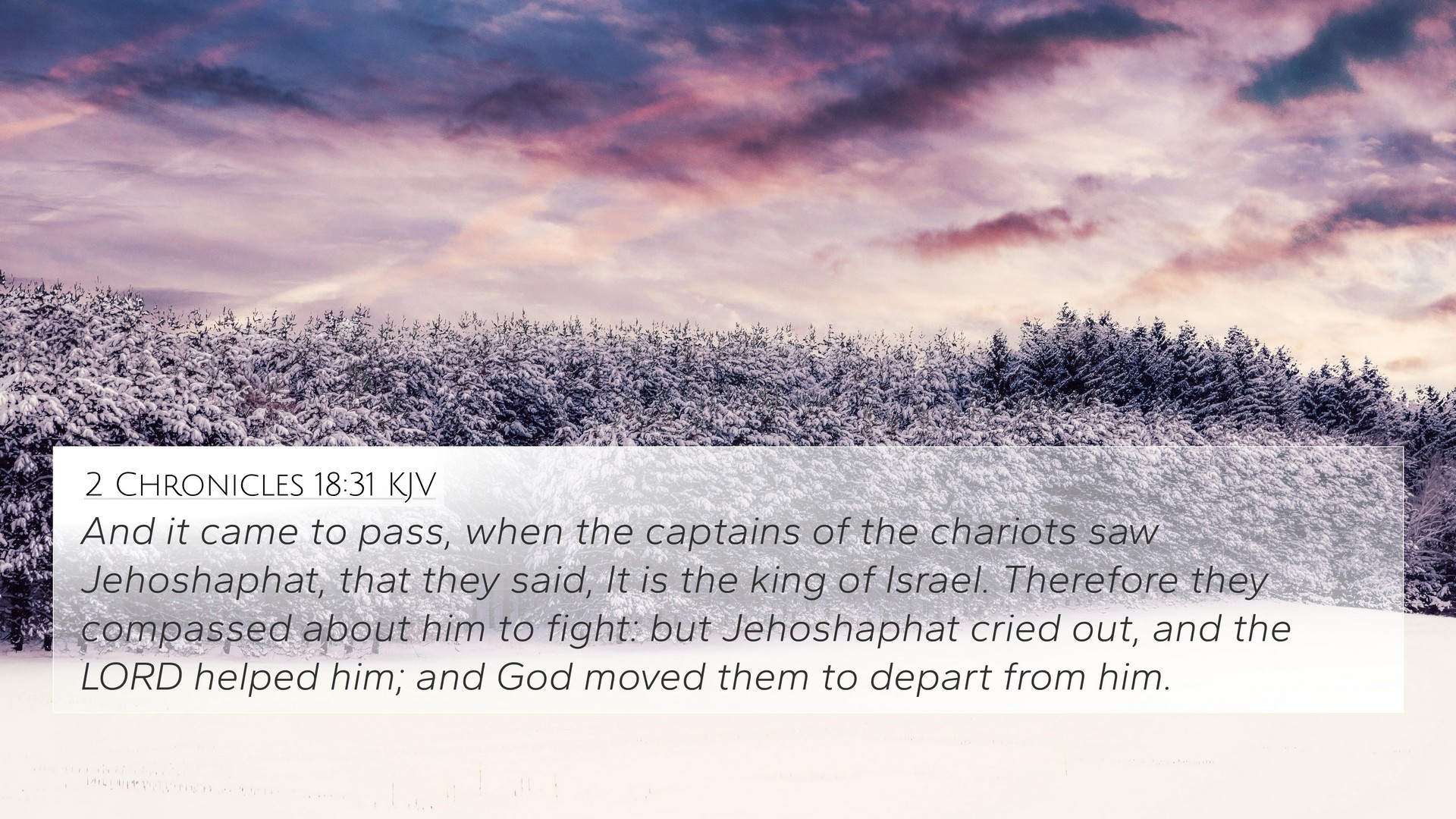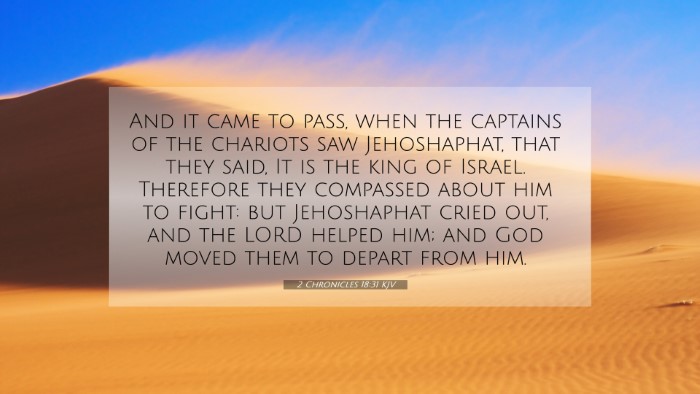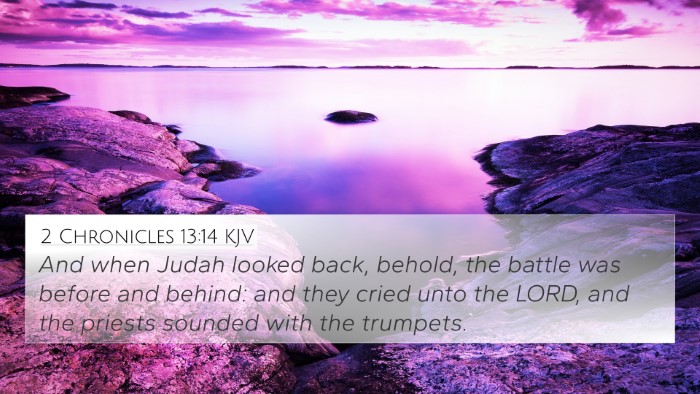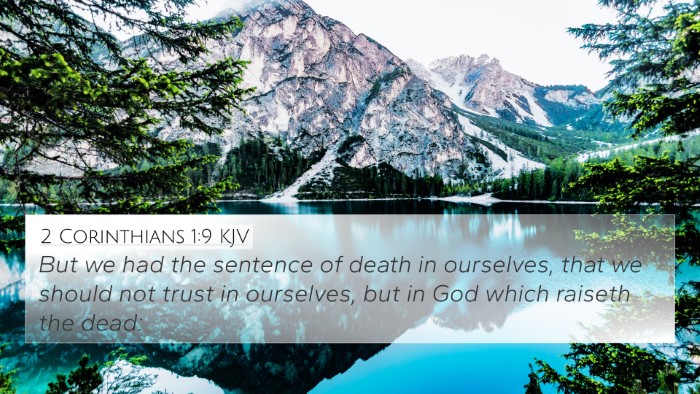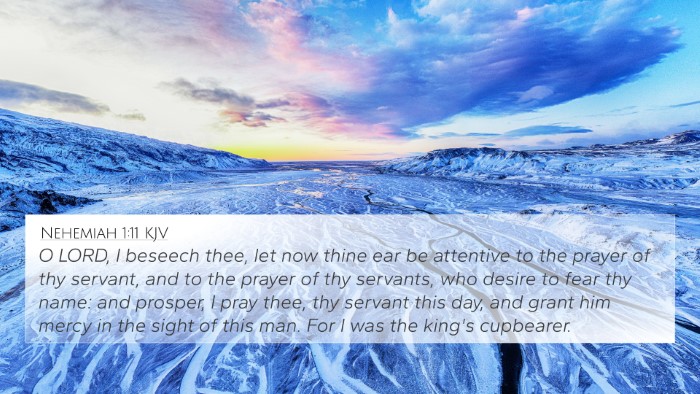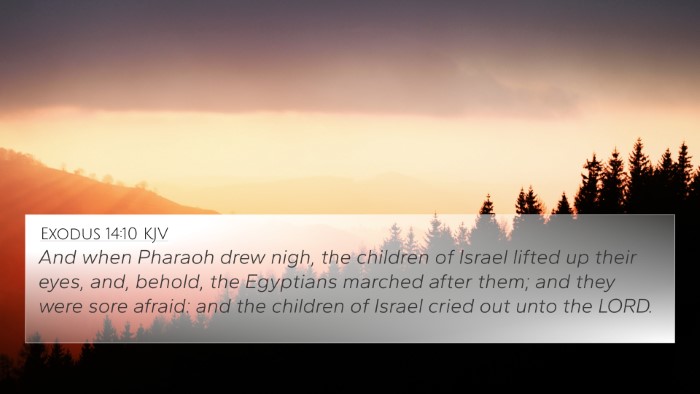Understanding 2 Chronicles 18:31
2 Chronicles 18:31 presents a powerful lesson in divine providence and communication between God and His people. In this verse, we witness King Jehoshaphat's involvement in a dire situation where he seeks alliances in battle, leading to a dramatic confrontation with truth. This commentary draws insights from various public domain sources, including Matthew Henry, Albert Barnes, and Adam Clarke, to illustrate the deeper meanings and theological implications behind this verse.
Verse Context
The context of 2 Chronicles 18 involves the interactions between the Israelite king Ahab and Jehoshaphat of Judah. They unite their forces against Ramoth-Gilead, but Jehoshaphat insists on seeking counsel from the Lord first. The consultation with the prophets and ultimately Micaiah reveals the spiritual dynamics at play and the consequences of ignoring God's voice.
Verse Analysis
Verse Text: "And it came to pass, when the captains of the chariots saw Jehoshaphat, that they said, It is the king of Israel. Therefore they compassed about him to fight: but Jehoshaphat cried out, and the LORD helped him; and God moved them to depart from him."
Theological Insights
The actions of Jehoshaphat highlight the importance of seeking divine guidance. His choice to consult with prophets reflects a faithful leader relying on God's wisdom in critical decisions. The response of the chariots' captains serves as a reminder of the dangers of misperception in spiritual and physical battles.
Key Themes
- Divine Intervention: The verse illustrates God's protective nature toward those who call upon Him.
- The folly of alliances: Jehoshaphat's alliance with Ahab serves as a warning against partnerships that may lead one away from God’s will.
- Faith in crisis: Jehoshaphat's cry to God captures the essence of relying on faith amidst adversity.
Commentary Perspectives
Matthew Henry: Henry emphasizes how God responds to Jehoshaphat's distress. He points out that true cries of faith activate divine deliverance and that God often uses unusual means to protect His followers.
Albert Barnes: Barnes notes the significance of recognizing God’s sovereignty in the midst of human conflict. His analysis highlights how divine aid is more powerful than any earthly threat, affirming God's hand in redirecting the enemies of His faithful servants.
Adam Clarke: Clarke provides insight into the nature of God’s intervention, pointing out that Jehoshaphat’s sincere appeal for help was met with immediate assistance, showcasing the effectiveness of earnest prayer in life-threatening situations.
Cross-References
To further explore the connections between Bible verses, we can identify several relevant cross-references:
- Psalm 18:6: "In my distress, I called upon the Lord, and cried unto my God: he heard my voice out of his temple, and my cry came before him, even into his ears."
- 1 Kings 22:32-34: Describes the prophecy and Micaiah’s warning to Ahab, emphasizing the peril of misled leaders.
- Isaiah 41:10: "Fear thou not; for I am with thee: be not dismayed; for I am thy God: I will strengthen thee; yea, I will help thee; yea, I will uphold thee with the right hand of my righteousness."
- James 1:5: "If any of you lack wisdom, let him ask of God, that giveth to all men liberally, and upbraideth not; and it shall be given him."
- 2 Chronicles 19:3: Jehoshaphat’s reforms reflect his commitment to God’s judgments, informing the importance of righteous governance.
- Proverbs 3:5-6: "Trust in the Lord with all thy heart; and lean not unto thine own understanding. In all thy ways acknowledge him, and he shall direct thy paths."
- Exodus 14:14: "The Lord shall fight for you, and ye shall hold your peace," which conveys God's role as protector.
Practical Applications
The insights gained from 2 Chronicles 18:31 can serve as guiding principles in our own lives:
- Seek God’s Guidance: In the face of decisions or conflicts, prioritize prayer and the counsel of godly individuals.
- Recognize Divine Protection: Remember that God is able to turn potential threats away from you when you call on Him.
- Be Cautious in Alliances: Engage in partnerships that align with God's will and avoid those that lead away from His truth.
Conclusion
2 Chronicles 18:31 serves as a poignant reminder of the importance of faith, the efficacy of calling upon God in times of trouble, and the need to align our actions with divine wisdom. Through this verse, we see the interconnectedness of biblical truths, urging believers to engage in a comprehensive study of the Word by utilizing resources like a Bible concordance, Bible cross-reference guide, and various Bible reference resources. By understanding how different scriptures relate, we can enrich our spiritual journey and enhance our understanding of God's character and His ways.
